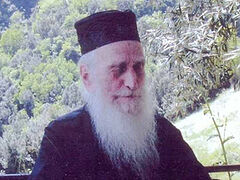One day, just before the holiday, he went into town with three other guardsmen of his battalion. They stopped by a busy tavern in the capital. It was filled with light and loud music: they ordered dinner with vodka and kept chatting cheerfully. Semyon kept more to himself. One of them asked him:
“Semyon, you keep it to yourself; what are you thinking about?”
“I reckon that we are sitting here in this tavern eating and drinking vodka, listening to music and having fun, but people on Athos are on prayer vigil right now and they will keep on praying all night long… So, who will receive the better answer at the Last Judgment, them or us?
 St. Silouan the Athonite. Born Semyon Antipov Then the other fellows said:
St. Silouan the Athonite. Born Semyon Antipov Then the other fellows said:
“You’re an interesting one, Semyon! We sit here listening to music and having fun, but you are on Mt. Athos and at the Last Judgment in your mind!”
—Archimandrite Sophrony (Sakharov). Elder Silouan.
***
Anytime a man says something, the only voice he hears inside is his own and he fails to hear what others say, even if they attempt to tell him of something really important. How can one hear the other? It can be quite hard, but it is very important.
How much more important it is to hear God’s voice—to quit running the rat race of life here on earth, so that in the silence you could hear not a command or an order to “do this or that,” but a voice from above.
What does God say to man? When you reach absolute silence inside and outside, you can discern His assurance inside your soul: “Life goes on!” The Bible says the Lord is in the still small voice (see: 1 Kings 19:12). He cannot be heard in the midst of storms or thunderstorms, or in the chaos of bustling metropolises. God is in the quiet of a human heart, in its humility. And whosoever shall exalt himself shall be abased; and he that shall humble himself shall be exalted (Matt. 23:12).
God is in the silence of man’s heart, in his humility
How can a man elevate himself if no one sees or hears him? But God knows about this. He comes into contact with our lives in silence and intimate quiet of our hearts. This feeling is more precious than the most precious treasure: gold or a diamond of the highest cut—they mean nothing compared to the grace, the significance and the meaning that fill the life of a man who comes to realize his closeness to God. What is it? Is it another kind of life, new circumstances, time and place? Yes and no.
Even in tempest and thunderstorms, in the midst of the chaos and the noise of the big cities, God is in the silence of the heart, if a man desires it. When we seek Him out and welcome Him, we come to the understanding that, “This is not just my utmost and choice possession; it is also what God wants me to have.” He expects and desires that a man hear his inner voice in order to understand his own self, made in His image, for it to become something highly desirable, precious and sought after in his life.
There are certain moments in life when we have to push our way through. The young people have still so much left to do, as they gain knowledge and travel their path in order to rise in the esteem of others. Such is our nature: We go through youth, aspirations, career growth, and then we see how all this becomes irrelevant. We read in the news how, say, the politicians are leaving their leadership positions to give way to the younger generation. Think about it: They were powerful people, everyone paid attention to them, but suddenly they call it a day—still full of energy and knowledge, they begin to live differently, moving away from what they previously considered important. The Lord expects us to withdraw from life this way.
St. Silouan the Athonite, the wondrous saint of our time, held a prominent position since his youth in in the village in the Tambov region: He was an energetic, healthy and intelligent young man. When he was in military service, his soul was pierced by faith. Later on, he asked for a blessing from a priest named John Sergiev, the future Holy Righteous John of Kronstadt: “Pray, Father, that the world doesn’t stop me from going to a monastery.” His ascent began at a young age, and St. Silouan the Athonite spent more than forty years in the monastery.
On the contrary, most of us spend the greater part of our lives actively as we aspire to reach our dreams. We leave other things for later, somehow for some other time, without giving much thought to who we are and where we are heading. Without all that rage of our earlier years, like, “Wow, he’s so smart, she’s so beautiful!”
But life goes on and we begin to realize that the main thing lying ahead is to find the way to acquire peace and quiet. This is the way of Christ, the way of getting small in the eyes of men, but becoming great in the eyes of the Lord. God places us next to His Son and in Him He reveals man just as he is. So long as a man cuts himself off from God, he does not understand why he needs to spend the remaining part of his life until the very last moment.
St. Silouan is called so because he became like Christ in his life, even though he sinned greatly in his youth. We read in the lives of many saints that they led life differently before changing, and living “in the image and likeness of God.” What is important is not how long you lived differently, but what goal you set in your latter part of life. What matters most is that very humbling that elevates man before God and places him next to the Son of God.
Christ walked the path of the passions—through humiliation, insult, banishment from society, scorn, and ridicule. It was done openly, in the most painful way, but He walked this path to the end. All of us encounter in some measure belittlement and humiliation in our lives, and we shouldn’t shun it, but greet it trusting in Christ Who bears His cross. If the weight of the cross pins you to the ground, it will immediately elevate you towards heaven and lift you upwards to God, along with Christ. That is why Semyon stayed silent when his friends were having fun at the tavern, while comtemplating the Athonite prayer and his answer at the Last Judgment.






